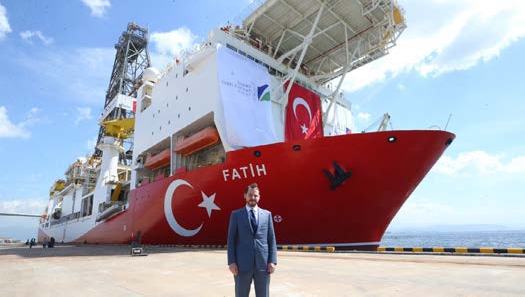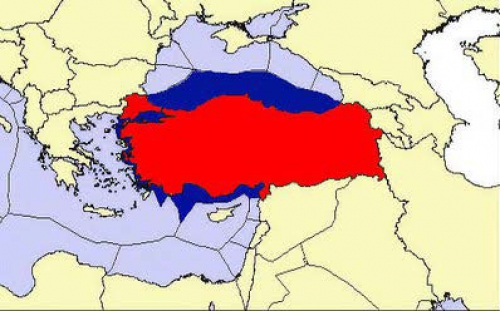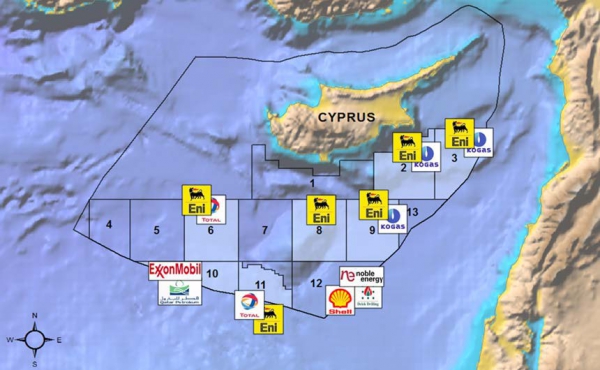[NGW Magazine] Turkey Launches E Med Campaign
Turkey's unique version of maritime law ignores islands' rights to continental shelves, giving it justification for what others see as trespassing on Cyprus' territory as it prepares to drill offshore.
Turkey’s first drillship was, at time of press, at Antalya being loaded with drilling equipment, waiting to start deep-water drilling operations in the eastern Mediterranean. Formerly known as DeepSea Metro-II, it has been renamed Fatih, meaning ‘conqueror’, after Istanbul's Ottoman Sultan Fatih Sultan Mehmet. It is 229 metres long and can drill to a maximum depth of 12,000 metres.
Figure 1: Turkey inaugurates its first drilling rig, Fatih

Berat Albayrak in front of the drilling rig, Fatih (Credit: Twitter/@BeratAlbayrak)
Characteristically, during the launching ceremony on May 31, Berat Albayrak, Turkey’s energy minister, said “the conquest of Istanbul opened a new era in world history and the deployment of the first drilling vessel marks the beginning of a new era in Turkey's oil and gas drilling objectives… We are witnessing a milestone in Turkish energy history.”
While this is part of Turkey’s plans to drill for oil and gas in the Black Sea and the Mediterranean to reduce dependence on imports, it poses challenges for Cyprus. No actual drilling targets have been announced, but possible locations appear to be within what in effect is Cyprus’ exclusive economic zone (EEZ), even if not formally declared, off the north and north-west coast.
In an interview in Hurriyet in July last year, Mithad Rende, formerly deputy director-general of energy and the environment at Turkey’s ministry of foreign affairs, and chairman of the executive committee of the OECD in 2014, said: “Turkey should buy a drillship and send it to where Greek Cypriots discovered gas.”
He added: “We have two vessels for seismic search, but at some point you need to drill. Greek Cypriots only understand the importance of the issue by a show of force, so in order to bring them to the negotiation table you need to do your own drilling… buy a drilling vessel and send it, and when you drill for oil and gas, you become a player there.”
This advice appears to have been followed to the letter. In less than a year Rende’s advice is about to become reality. But in order to understand what lies ahead, Turkey’s plans need some examination.
Turkey’s drilling plans
Turkey imports most of the oil and gas it consumes. Its own production covers only about 6% of its oil needs and 1% of its gas needs. And that’s expensive. The country paid $37.2bn for its energy imports last year compared with $27.2bn in 2016, and with the oil price approaching $80/barrel this year, the cost could go up by another 25%.
This is what has driven Turkey to develop a national energy policy, announced in April 2017, centred on higher exploration activity in the Black Sea and the Mediterranean and to invest in developing its own drilling capability. Even though this is costly and risky, Turkey’s determination to reduce its dependency on energy imports should not be underestimated.
Figure 2: Turkey’s EEZ

Credit: Global Marine Boundaries Database
This was confirmed by Albayrak when speaking at a ceremony to launch the drillship Fatih on the northern coast of the Sea of Marmara. He said that Turkey is about to start oil and gas exploration both in the Black Sea and in the Mediterranean involving Fatih and two seismic survey vessels, Barbaros and Oruc Reis.
He also announced that negotiations are underway to purchase a second drilling ship to support these plans. Turkey is also planning to start drilling for oil in the southeastern provinces that border Iraq.
Albayrak stressed Turkey’s ambition to become a global player in oil and gas drilling, relying on Turkish engineers who will run and manage the operations. He said: “We are witnessing a milestone in Turkish energy history... the dream of deep-sea drilling activities has not been accomplished since the 1970s because of the lack of trained staff and technologically adequate local machinery…. Today, Turkey enjoys the results of energy transformation stimulated by the mobilisation of domestic resources.”
The importance of the energy sector to Turkey is evident with the appointment of Albayrak, the son-in-law and likely successor of the president, Recep Tayyip Erdogan, to this ministry.
During the launching, Albayrak said that Fatih is scheduled to conduct deep-sea drilling operations off Antalya's shores, with the first well expected to reach 2,600 metres in depth. This is likely to be within Turkey’s jurisdiction, probably in time to impact the presidential and parliamentary elections on June 24.
However, this may be followed later in the year by drilling within the Cyprus EEZ, probably coinciding with ExxonMobil’s drilling in block 10 in October. While Turkey has no claims on and may not intervene in block 10, as it did with block 3, it is likely to draw attention and assert its claims at a time that will have maximum impact.
Implications for Cyprus
During the launching ceremony, Albayrak said that “Turkey will continue to exercise its rights ensuing from international maritime law both in the Black Sea and Mediterranean Sea.”
His position is that the Turkish Cypriots and Turkey have been conducting seismic surveys in areas off Cyprus within the ‘EEZ’ declared by Turkish Cypriots, exercising its legal rights in accordance with international maritime law in partnership with Turkish Petroleum Company (TPAO).
Rende said as much in his interview: “Turkish Cypriots have declared their own blocks and awarded licences to TPAO…TPAO has the right to start drilling.”
In an article in Daily Sabah in May it is claimed that: “By unilaterally declaring an exclusive economic zone and granting licences to international energy firms without due consideration of the rights of the Republic of Turkey and Turkish Cypriots, the Greek Cypriot administration is trying to usurp Turkey's territorial rights. But the international maritime law allows Turkey and the Turkish Cypriots to exercise their rights in the region.” Turkey says it will prevent Cyprus from searching for gas and oil off its coast if Turkish Cypriots are not included in the process.
These rights are based on a unique interpretation of international maritime law, pursued only by Turkey, based on national territories having continental shelves up to 200 miles while islands are limited to territorial waters. This view contradicts international maritime law, as defined by the United Nations Convention on the Law of the Seas (Unclos).
On top of this Turkey does not recognise Cyprus as an independent country. Based on this interpretation it divided the eastern Mediterranean between itself and Egypt, treating Cyprus as an island with no rights to a continental shelf.
This, for example, means that block 10, where ExxonMobil is planning to drill in October following a licence award by Cyprus, belongs to Egypt. However, Unclos recognises the rights of islands to continental shelves and accordingly the international community and the oil majors respect Cyprus’ rights to its EEZ.
Unfortunately Turkey is prepared to use its military might to support the assertion of what it sees as its rights in the region.
Cyprus must continue pursuing its own plans despite Turkish provocation. The IOCs support this as was reconfirmed in May by French major Total that, despite the actions of the Turkish navy in stopping exploration in block 3, it is acquiring 50% of block 8, and likely of blocks 2, 3 and 9, extending its partnership with Eni. Cyprus cannot stop any incursions by Turkey within its EEZ, but should continue pursuing its legal rights by any means possible. But above all it must not be deflected and must stick to its own plans.
Figure 3: Cyprus EEZ

Credit: Cyprus Ministry of Energy
All eyes are on ExxonMobil’s planned drilling in block 10 in October. Should a significant discovery be made, it promises to be a game-changer. As witnessed by statements made by Assistant Secretary of State Wess Mitchell in early June, the US supports Cyprus’ rights to explore and develop hydrocarbons in its EEZ. He said: “We’ve been clear in our messaging with Turkish officials that the harassment of drilling vessels in the Cyprus EEZ is not something that we will allow to go unnoticed or not speak up about.” He also reiterated his country’s support for a bi-zonal federation as the form of the island’s reunification.
This is in line with a statement issued by the US State Department early March that it recognises the right of Cyprus to develop the resources in its EEZ, and discourages any actions or statements that provoke a rise in tensions in the region. US policy on Cyprus’ EEZ is long-standing and has not changed. The statement also said: “We continue to believe the island’s oil and gas resources, like all of its resources, should be equitably shared between both communities in the context of an overall settlement.” Cyprus’ government has re-affirmed that.
Preparations continue
In the meanwhile, Turkey continues preparations to drill its first offshore well. Not surprisingly, this has also become an election issue. Erdogan in his speech at the opening ceremony for the TransAnatolian Pipeline said: "We sent Fatih, our first national drilling rig, to the Mediterranean," adding that with this ship, equipped with the most advanced technology in the world, a weakness in Turkey’s offshore capabilities has been addressed.
In a statement on Turkey's energy programmes, the Turkish energy undersecretary Fatih Donmez said: “We hope to do the first drilling in the Mediterranean.” He added that Turkey has already evaluated all available seismic survey evidence and is planning to carry out “its first drilling in the place that seems most appropriate."
He did not specify an exact location, but said the goal was to do two drillings in the year. But he confirmed that Turkey will do this with its own drilling rig, largely using its own staff and crew.
Charles Ellinas



